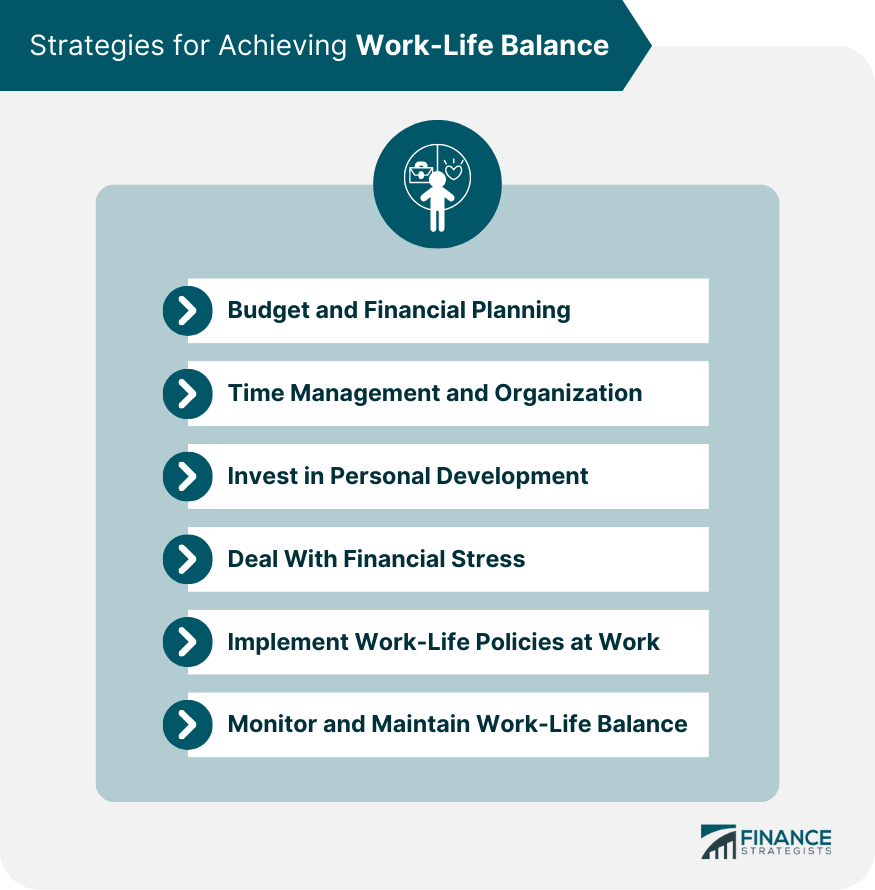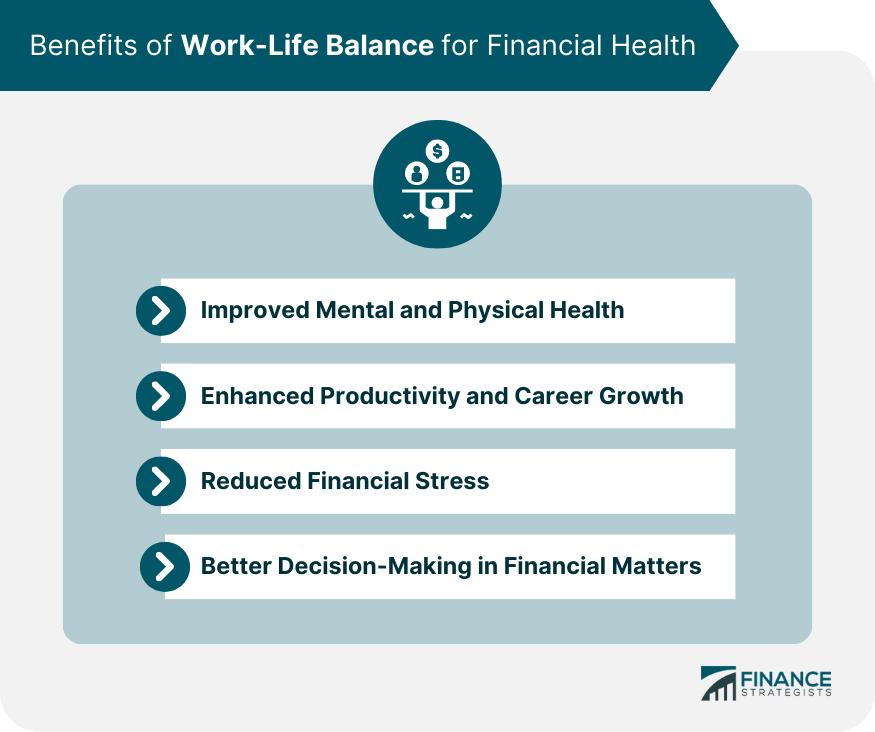Work-life balance refers to the equilibrium between professional responsibilities and personal life, where an individual can allocate time and energy effectively to meet the demands of both aspects. Maintaining a healthy work-life balance is essential for overall well-being, including mental and physical health, relationships, and financial stability. Creating a budget and setting clear financial goals allows individuals to allocate resources effectively, helping them achieve a healthy work-life balance. Identifying priorities, such as paying off debt, saving for emergencies, or investing for the future, provides a roadmap for financial success. Establishing an emergency fund and building a savings cushion can alleviate financial stress and contribute to a better work-life balance. This financial safety net can help individuals navigate unexpected expenses or income loss without jeopardizing their well-being. Planning for retirement and setting aside funds early on can help individuals achieve long-term financial security. This foresight reduces stress and allows for better work-life balance, as individuals can focus on personal and professional growth without worrying about their future. Establishing clear boundaries between work and personal life is crucial for maintaining a healthy work-life balance. This includes setting specific work hours, avoiding work-related tasks during personal time, and communicating expectations with colleagues and family members. Intentionally scheduling personal time and vacations allow individuals to recharge, maintain a healthy work-life balance, and avoid burnout. Additionally, taking time off can provide opportunities to evaluate financial goals and make necessary adjustments. Implementing time management and productivity tools, such as to-do lists, calendars, or time-tracking apps, can help individuals allocate time efficiently and maintain a balanced lifestyle. This organization enables individuals to focus on financial goals and make progress in their personal and professional lives. Developing financial literacy and seeking opportunities to learn about personal finance can empower individuals to make better financial decisions, ultimately supporting a healthy work-life balance. This education can include reading books, attending workshops, or following financial blogs and podcasts. Investing in professional development and networking can lead to career growth, higher income potential, and improved financial stability. By prioritizing learning and relationship-building, individuals can achieve a better work-life balance and long-term financial success. Engaging in hobbies and interests outside of work helps individuals maintain a balanced lifestyle, reduce stress, and enhance overall well-being. Pursuing passions and interests can also contribute to personal growth and may even lead to additional income opportunities, further supporting financial stability. Recognizing and addressing the sources of financial stress is essential for maintaining a balanced life. By identifying these triggers, individuals can develop effective strategies to manage stress and improve their financial situation. Consulting with financial advisors or therapists can provide valuable guidance for individuals experiencing financial stress. These professionals can offer tailored advice and resources to help individuals navigate financial challenges and achieve a healthier work-life balance. Adopting healthy coping mechanisms, such as exercise, meditation, or journaling, can help individuals manage financial stress and maintain a balanced lifestyle. These practices can also enhance mental and physical well-being, leading to better decision-making in financial matters. Employers can support work-life balance by offering flexible work schedules, allowing employees to manage their personal and professional responsibilities more effectively. This flexibility can contribute to reduced stress, improved productivity, and better financial management. Workplace financial wellness programs can equip employees with the knowledge and tools needed to manage their finances effectively, contributing to a healthier work-life balance. These programs may include financial education workshops, one-on-one consultations, or access to financial planning resources. Employers can promote work-life balance by providing resources and support for employees mental health and well-being. This can include offering mental health benefits, providing access to counseling services, or fostering a supportive work environment. Periodically reviewing and adjusting financial plans can help individuals maintain a healthy work-life balance and achieve their financial goals. Regular check-ups can identify areas for improvement and ensure that individuals stay on track with their financial objectives. Evaluating personal and professional growth can provide valuable insights into how well individuals are managing their work-life balance. This self-assessment can help individuals identify areas for improvement and implement strategies to achieve a more balanced lifestyle. Maintaining a healthy work-life balance requires adaptability and resilience, as individuals may face unexpected challenges or changes in their personal and professional lives. Embracing these qualities can help individuals navigate obstacles and maintain financial stability. A well-balanced lifestyle contributes to better mental and physical health, reducing the likelihood of stress-related illnesses and their associated costs. By dedicating time to self-care, exercise, and hobbies, individuals can minimize healthcare expenses and maintain a healthier lifestyle. Achieving a healthy work-life balance can lead to increased productivity and focus, resulting in career growth and higher income potential. This growth, in turn, supports better financial management and long-term financial security. By effectively managing work and personal life, individuals can alleviate financial stress and make more informed decisions. A balanced lifestyle enables people to address financial concerns proactively, avoiding costly mistakes or impulsive decisions. A balanced life allows for more time to research, learn, and make informed choices regarding investments, savings, and debt management. This can lead to more effective financial strategies and long-term financial stability. A healthy work-life balance plays a crucial role in overall well-being, with significant implications for financial health. A balanced lifestyle can lead to improved mental and physical health, enhanced productivity, career growth, reduced financial stress, and better decision-making. By implementing effective strategies such as budgeting and financial planning, time management, personal development, and stress management, individuals can create a more balanced life that supports financial stability. Employers can also contribute by offering flexible work schedules, financial wellness programs, and mental health support. Regular monitoring and maintenance of work-life balance, along with adaptability and resilience, are essential for long-term financial success and a fulfilling life.Understanding Work-Life Balance
Strategies for Achieving Work-Life Balance

Budgeting and Financial Planning
Prioritizing Financial Goals
Emergency Funds and Savings
Retirement Planning
Time Management and Organization
Setting Work Boundaries
Planning Personal Time and Vacations
Utilizing Productivity Tools and Techniques
Investing in Personal Development
Financial Education and Literacy
Professional Development and Networking
Pursuing Hobbies and Interests
Dealing with Financial Stress
Identifying Stress Triggers
Seeking Professional Help
Developing Healthy Coping Mechanisms
Implementing Work-Life Balance Policies at the Workplace
Encouraging Flexible Work Schedules
Providing Financial Wellness Programs
Supporting Employee Mental Health and Well-Being
Monitoring and Maintaining Work-Life Balance
Regular Financial Check-Ups and Adjustments
Assessing Personal and Professional Growth
Embracing Adaptability and Resilience
Benefits of Work-Life Balance for Financial Health

Improved Mental and Physical Health
Enhanced Productivity and Career Growth
Reduced Financial Stress
Better Decision-Making in Financial Matters
Conclusion
Work-Life Balance FAQs
Work-life balance can lead to better mental and physical health, enhanced productivity and career growth, reduced financial stress, and improved decision-making in financial matters. By achieving a balanced lifestyle, individuals can make more informed financial decisions and effectively manage their resources.
Strategies for achieving work-life balance include budgeting and financial planning, time management and organization, investing in personal development, and dealing with financial stress. By implementing these strategies, individuals can create a more balanced lifestyle that supports financial stability.
Employers can support work-life balance by encouraging flexible work schedules, providing financial wellness programs, and supporting employee mental health and well-being. These initiatives can help employees manage their personal and professional responsibilities more effectively, leading to improved financial health.
Monitoring and maintaining work-life balance ensures that individuals stay on track with their financial goals and make necessary adjustments as their personal and professional circumstances change. Regular financial check-ups, assessing personal and professional growth, and embracing adaptability and resilience can help individuals maintain a healthy work-life balance and achieve long-term financial success.
Achieving work-life balance contributes to long-term financial stability by promoting better mental and physical health, increased productivity and career growth, reduced financial stress, and improved decision-making in financial matters. Maintaining a balanced lifestyle allows individuals to focus on financial goals, make progress in their personal and professional lives, and enjoy a more fulfilling life.
True Tamplin is a published author, public speaker, CEO of UpDigital, and founder of Finance Strategists.
True is a Certified Educator in Personal Finance (CEPF®), author of The Handy Financial Ratios Guide, a member of the Society for Advancing Business Editing and Writing, contributes to his financial education site, Finance Strategists, and has spoken to various financial communities such as the CFA Institute, as well as university students like his Alma mater, Biola University, where he received a bachelor of science in business and data analytics.
To learn more about True, visit his personal website or view his author profiles on Amazon, Nasdaq and Forbes.















